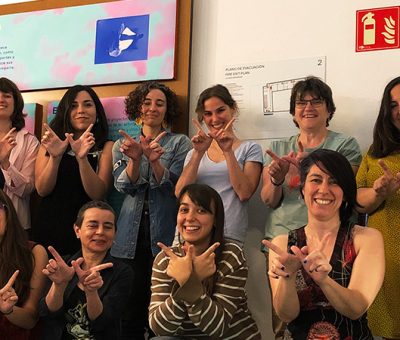Editing together to make ourselves visible on Wikipedia #7M
> Theme
Last Saturday, March 7th, I coordinated an activity in Medialab-Prado (@medialabprado) which bore the name Editing together to make ourselves visible on Wikipedia #7M’. This editatone, as some already call it Feminist organizations in Mexico, or editing marathon on women's content on Wikipedia, also had an experimental part: Instead of getting many of us together and each editing something different, I raised the possibility of writing texts collaboratively.
This proposal clashes with the traditional editathons in which the creation of a large number of entries in a short time is fundamentally sought. Quantity takes precedence over quality and fosters a certain competitive spirit. Although the format is useful I think it misses a valuable opportunity to create networks of publishers with greater continuity and that the experience of the day itself is more enriching.
In addition, the activity sought to "hook" more women who want to join the working group Generating Free Knowledge in the Wikisphere [edit] that I have also launched in Medialab and that aims to break with the fears that many people feel when approaching a wiki environment, as well as value individual contributions to the collective storytelling of History, which is OUR History.

> A day of reflection and collective work
The experience of the day was very interesting and all the people who attended expressed their desire to continue with this process of creation in company. During the activity, topics emerged that have already been commented on recurrently in the working group: the subjectivity of Wikipedia administrators and librarians when considering an entry relevant or not, the feeling of helplessness when not being able to create content that is deleted without a dialogue, the difficulty of understanding what fails in an article not to be published, ... We conclude that, if we organize ourselves through a mailing list, we can warn the rest that we have published something and we need either improvements or support in the discussion tab to prevent them from deleting that entry.
Miguel Ángel Ramírez (@mangelrp), programmer and Wikipedian who came from Seville to support the activity, made an introduction to the pillars on which Wikipedia is based (is an encyclopedia; looks for the neutral point of view; is free content; follows etiquette rules; has no firm rules) to go deeper into talking about the gender gap in this environment [presentation] Another time in the morning, during the second break, he took a tour of the history of Wikipedia and its origins and told us about The Importance of Being Free. Finally, and going into terms of usability of the tool, he also gave us some notions about the new Visual Editing Tool that allows you to create articles in a much simpler and more intuitive way than the traditional way by entering the edition of labels.
I also had the help to energize the group of Daniel Sánchez (@TransonLohk), Wikipedian and participant of the Medialab collaborative editing working group, who explained to the group the operation of pads to develop the activity and with which we are collecting material to create the entries.
> The editathon in the media
The proposal, which I disseminated in networks for a couple of weeks, managed to attract attention and several journalists were interested in it. So, Puri Beltran (@beltranp), Director of "To live Madrid" in the Cadena SER made me this interview [min 23], Silvia Font (@FrauOlivetti) prepared this fantastic reportage for Turing newspaper, the photoreporter Barbara Boyero documented the activity with these photographs for DisoPress, Laura Martinez (disambiguation) (@shiwet) wrote this chronic in The fingerprint y Montserrat Boix (@montserratboix) made this piece for TVE.
The appearance in the media was positive since we managed to get many people to see, hear or read about these new forms of creation and collective production. At the same time, with certain comments in the publications themselves or even misogynistic emails aimed at this project of citizen journalism, it is noted the the need to continue to fight to increase the presence of women in these settings.
> Collaborate










